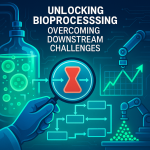Introduction:
Implementing a digitization and automation strategy is crucial for improving R&D productivity in bioprocessing. According to researchers at the Roche Innovation Center, digitalization and automation can reduce cycle times and costs, increase work in progress, and enhance the probability of technical success. However, a well-defined strategy is necessary to maximize the benefits of digitization and automation.
- Roche’s process research department transitioned from paper to electronic lab notebooks (ELNs) in 2008, which was a significant milestone in the digital transformation of their laboratories.
- To address higher throughput and automation, Roche focused on improving software performance and stability, software usability, and incorporating diverse data.
- Roche developed a digital lab automation platform called AutoLab and an experiment-management platform to support digitization and automation in bioprocessing.
- The Experiment Manager allows users to plan bioprocess experiments and leverage automated workflow execution capabilities.
- Data availability and integration are crucial for developing visualizations, analysis, and machine learning solutions.
Conclusion:
Implementing a digitization and automation strategy, such as the one developed by Roche, is essential for optimizing R&D productivity in bioprocessing. The use of electronic lab notebooks, digital lab automation platforms, and experiment management platforms can streamline processes, increase efficiency, and improve data availability and integration. These advancements in technology have the potential to revolutionize bioprocessing and drive innovation in the field.



